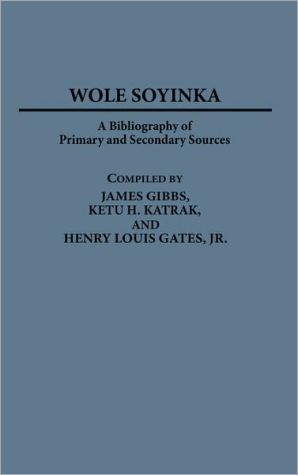

 |

|

The average rating for Wole Soyinka: A Bibliography of Primary and Secondary Sources, Vol. 7 based on 2 reviews is 5 stars.
Review # 1 was written on 2019-02-11 00:00:00 Nate Crain Nate CrainAn excellent introduction to Wole Soyinka's plays up to 1986. After a brief but concise background on Soyinka in the first chapter, Gibbs moves on to discuss the sources and influences that inspired all the plays mentioned in the book. This second chapter is fascinating and offers a glimpse into how the creative process of a talented mind derives his ideas. The remaining seven chapters discuss in relative detail the summaries, backgrounds, and key performances of all the plays published and/or performed. Soyinka's output until 1986, the year he won the Nobel Prize for Literature, was substantial. He not only published memoirs, novels, short stories, poetry collections, essays, radio plays, and collaborated in film, in directing a few of his plays, as well as acting in a few of them, and not to forget his steadfast political activism, a stint that landed him for 22 months in solitary confinement, but he also published many successful plays. All this by the age of 52 only, his is anything but a mediocre life. Gibbs captures in the span of 17 pages the highlights of Soyinka's life and publications, placing them all in context. Soyinka moved in a world in which expressions of drama were near at hand, for the performing arts were close to the surface of life in the parsonage. The magic of this book is the second chapter: 'Sources and Influences.' Whether steeped in the European tradition, classical Greek plays, Yoruba mythology, or even environmental factors in Soyinka's upbringing and the political turmoil, Gibbs tackles beautifully and effortlessly the source of each play. Like European playwrights from Sophocles to Shakespeare to Brecht, he regards eclecticism as a right, maintaining that it is what an artist does with borrowed material that is important; what or how much he takes is not significant. Gibbs primary sensitivity is to the performances of the plays, basing his analysis in the remaining chapters on theatrical analysis rather than textual analysis, a point he believes caused many critics to overlook the magic in Soyinka's plays. This perception of a scholar analyzing a performing art from the right angle, performance, is rather refreshing in such a study. It is all the more important here because the influences of Yoruba masquerade tradition on Soyinka imply the productions involve "acrobatic dances and dance dramas," not to mention also special costumes, masks, singing, and so on, all of which add to the sensory experience. The lesson to draw from [Soyinka's plays] is that it is necessary to stand back from Soyinka's words in order to appreciate the stage images he creates and the patterns into which his plays fall. I especially love how Gibbs never forgets the political context of the plays. This is significant not only for the historical background, but to also understand the nuances expressed, whether in satire, absurdism, or realism, all modes which Soyinka works with. For example, in the satirical play Jero's Metamorphosis: Jero negotiates with prophets and civil servants alike from an apparently invincible position. There are no grounds for hope of positive change in this play, and Soyinka has been charged with fatalism, pessimism and nihilism. But wait… Gibbs does not accept at face value these judgments on Soyinka. In a more detailed context, we learn that none of Soyinka's friends in Nigeria, upon receiving a copy of the manuscript, wanted to publish the play. Not until: … the soldiers were temporarily in their barracks. The grounds for pessimism … [lie] in the reluctance of African directors and actors to hold this mirror up to military regimes. Soyinka's courage and outspokenness have not been matched by similar qualities in others. My one disappointment is the lack of any information in the book about its author, James Gibbs. What a terrible oversight by the publishers/editors. I want to know more about this analytical scholar who studied and experienced Soyinka's plays in performance. I want to understand his motivations and his interests in a Nigerian playwright. For an introduction to Soyinka's plays, an understanding of their sources and influences, and a critical perspective of the plays primarily from a theatrical analysis over that of a textual one, this is a really good book. |
Review # 2 was written on 2015-09-01 00:00:00 Susan Purnell Susan PurnellAnother thorough study on Wole Soyinka, African Nobel Laureate in Literature. This monograph traces the development of Soyinka, mainly as a playwright - with a lot of focus on the performance of the plays, with many photos of sundry performances included in this work. The author does not hide his admiration for the "genius" Soyinka, starting from his early works; and intermittently Gibbs even simplifies the language/interpretation of the playwright and his drama. At the time this work was published, this was a comprehensive introduction to Soyinka and his theatre. Still an excellent read, though. |
CAN'T FIND WHAT YOU'RE LOOKING FOR? CLICK HERE!!!